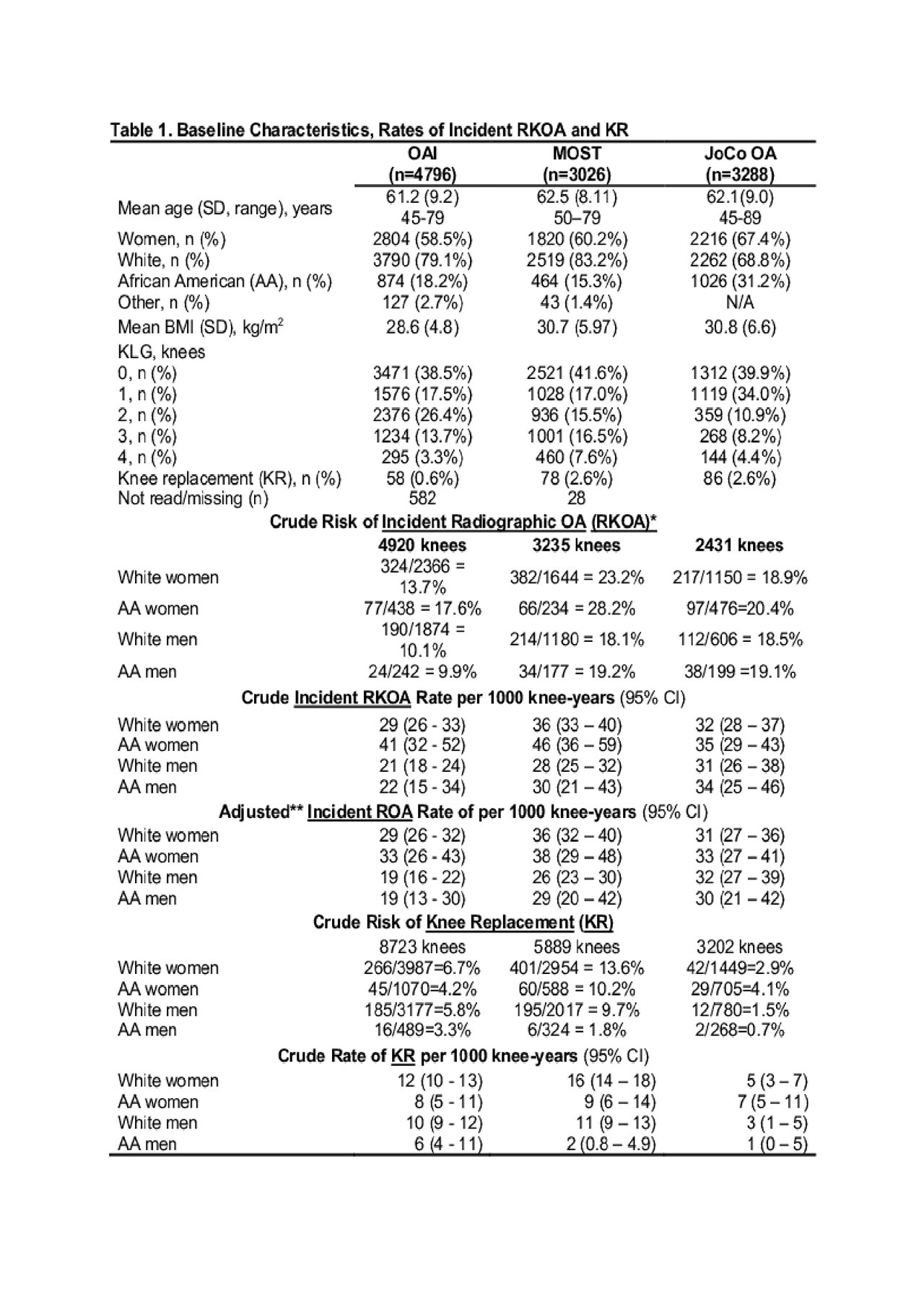Session Information
Session Type: Poster Session (Monday)
Session Time: 9:00AM-11:00AM
Background/Purpose: Previous studies have suggested differences in the development of incident radiographic knee osteoarthritis (RKOA) and the receipt of knee replacement (KR) by sex and race. We now have the opportunity to compare outcomes from three of the largest and most diverse osteoarthritis cohorts, that is, the Osteoarthritis Initiative (OAI), the Multicenter Osteoarthritis Study (MOST) and the Johnston County Osteoarthritis Project (JoCo OA). Our objective was to describe sex- and race-specific rates of incident RKOA and KR in OAI, MOST and JoCo OA.
Methods: Participants from OAI, MOST and JoCo OA with knees at risk of developing incident ROA (i.e., Kellgren-Lawrence Grade [KLG] 0 or 1 at baseline) or knees at risk for KR (KL 0 to 4 at baseline) were eligible for inclusion. Participants in all three cohorts underwent bilateral posteroanterior fixed-flexion weight-bearing knee radiographs with similar acquisition protocols. RKOA was defined as KLG ≥ 2. KR (i.e., total or partial) was verified by operative reports or on a subsequent knee x-ray. We used Poisson regression with ln(time) offset and robust standard errors to estimate rates of incident RKOA and rates of KR, adjusted for age and BMI.
Results: Baseline characteristics and results are summarized in Table 1. The baseline characteristics were similar between OAI (n=4796) and MOST (n=3026). JoCo OA (n=3288) had a larger proportion of women, African Americans (AA), and milder disease (i.e., proportionately more KLG 1 at baseline) due to its population-based nature. The sex- and race-specific rates of incident RKOA were comparable in JoCo OA, whereas rates of incident RKOA were notably higher among women, and particularly AA women, compared to men in OAI and MOST. KR rates were higher for white men and women in OAI and MOST; overall rates of KR were lower in JoCo OA, but AA women had the highest rates in that cohort.
Conclusion: These preliminary results represent the first step in harmonizing data across three large, diverse, longitudinal OA cohort studies and will allow direct comparison across these cohorts in the future. These data point to potential regional differences in incident RKOA and KR by sex and race, or to potential differences in enrollment criteria across the three cohorts. Future work will include pooling data from these cohorts, taking advantage of the substantial number of AAs, to allow for direct comparisons and the investigation of underlying risk factors that may explain differences in the rates of incident RKOA and KR, as well as other outcomes.
To cite this abstract in AMA style:
Kwoh C, Nelson A, Golightly Y, Ashbeck E, Arbeeva L, Wang N, Duryea J, Neogi T. Rates of Incident Radiographic Knee Osteoarthritis and Knee Replacement by Sex and Race, Across Three Large, Diverse Cohorts [abstract]. Arthritis Rheumatol. 2019; 71 (suppl 10). https://acrabstracts.org/abstract/rates-of-incident-radiographic-knee-osteoarthritis-and-knee-replacement-by-sex-and-race-across-three-large-diverse-cohorts/. Accessed .« Back to 2019 ACR/ARP Annual Meeting
ACR Meeting Abstracts - https://acrabstracts.org/abstract/rates-of-incident-radiographic-knee-osteoarthritis-and-knee-replacement-by-sex-and-race-across-three-large-diverse-cohorts/

